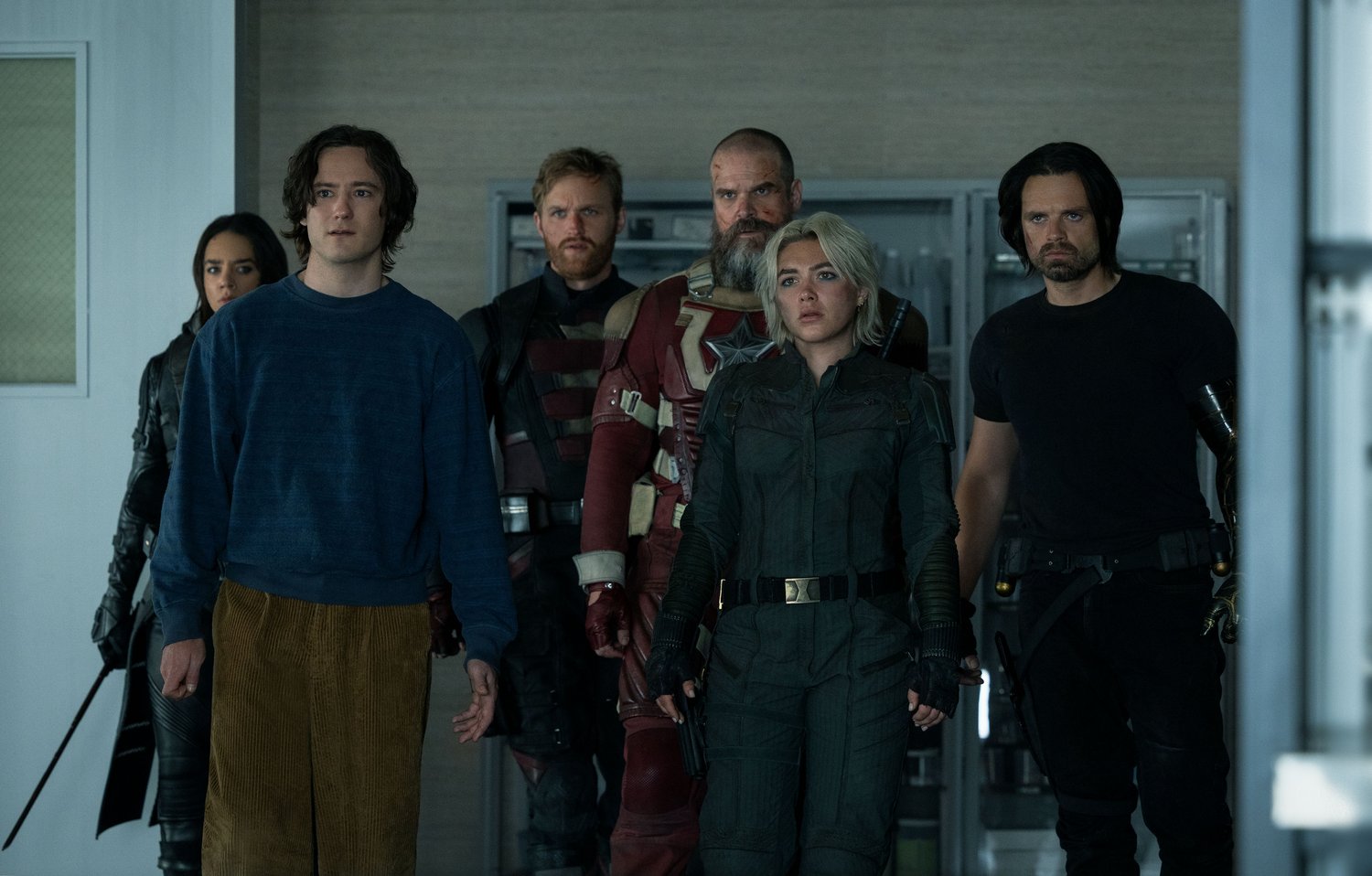Images courtesy of Marvel Studios
THUNDERBOLTS*– 2 STARS
The treat and conceit of the new Marvel movie Thunderbolts* and its source late 1990s comic book is watching villains trying to go straight and come together as a team. They’re being thrust into service because of the silly asterisk included in the film’s title indicating that “The Avengers are Not Available.” So, what does it look like to see born losers and ne’er-do-wells dripping with anti-hero egos used in this way?
LESSON #1: SAY HELLO TO THE BAD GUY— Borrowing from another creation down the hall at the Mouse House, Wreck-It Ralph comes to mind and his cameo-filled “BAD-ANON” group therapy session at the beginning of the 2012 animated movie. The Thunderbolts—named after a pee wee soccer team— are a hodgepodge of castoffs who quite likely carry Ralph’s internal envy of “It sure must be nice being the good boy.” They need someone to be the Zangief of the meeting asking “Why do you have to be so bad?” and “You are a bad guy, but does that mean you are a ‘bad’ guy?” In his movie, Ralph doesn’t get it, but here watching Thunderbolts* we see the truth of all that.
Thunderbolts* stands as a culmination of how Valentina Allegra de Fontaine has been touted and built as a bureaucratic heavy for the last five years in the Marvel Cinematic Universe, ascended to become the Director of the CIA at the end of Black Panther: Wakanda Forever. Played by the incomparable Emmy winner Julia Louis-Dreyfus at her smarmiest, Valentina has politicians and powerful people alike wrapped around her finger, becoming the puppeteer of this movie. She’s been collecting broken toys, so to speak, since her MCU debut in 2021. Those steeped in their universe history know she has courted the disgraced Captain America replacement John Walker (Wyatt Russell) during The Falcon and the Winter Soldier and ex-Red Room assassin Yelena Belova (the front-and-center Florence Pugh) at the end of Black Widow.
In her fancy and highly scrutinized new position, Valentina Allegra de Fontaine is facing very ugly and public impeachment proceedings, requiring her to cover up her nefarious and off-the-reservation black ops behavior. With the help of her diligent and morally ambiguous personal assistant Mel (Geraldine Viswanathan of Blockers), she is incinerating documents and blowing up entire facilities, no matter who or what is inside them. The final step of that clean up is assigning her notable and formidable assets to eliminate each other.
That scheme has Yelena intersecting John Walker, the advanced combat imitator Taskmaster (Olga Kurylenko) from Black Widow, and the molecular-phasing Ghost (Hannah John-Kamen) last seen in Ant-Man and the Wasp at a secret Utah desert facility. Realizing the ploy and betrayal at hand, they decide to work together to escape and survive. The wild card becomes the discovery of Robert “Bob” Reynolds (Lewis Pullman of Press Play and Skincare, playing another dorky Bob after Top Gun: Maverick), a confused and troubled human test subject from Valentina’s Project Sentry program who mysteriously can tap into and manipulate people’s memories and nightmares.
Once escaped and on the lam to expose Valentina, the motley crew is joined by Yelena’s ex-national hero father Red Guardian (Stranger Things fan favorite David Harbour) and the newly elected U.S. congressman from Brooklyn, namely James “Bucky” Barnes—the famed Winter Soldier played by recent The Apprentice Oscar nominee Sebastian Stan. The more they pursue Valentina’s dealings, the more their mission becomes protecting Bob, the dangerous linchpin for her warped desire and political motivations to engineer her own super-powered people to answer that aforementioned asterisk and replace the departed and retired Avengers.
LESSON #2: RECOUPING FROM FAILURE– Each returning MCU member of the Thunderbolts* has found themselves working for sketchy Valentina Allegra de Fontaine because of previous high-profile failures. Epitomized by an unnecessary opening narration from Yelena monologuing about the usefulness and general point of their combative and clandestine jobs, the formerly feared or adored thought working for her would give them redemption or promotion. Neither have come and nothing has motivated them to become anything better until this point of becoming “disposable delinquents.”
As the action goes, second unit director George Cottle (Deadpool and Wolverine) find plenty of things to blow up. By having this larger cast of top-notch fighters, stunt coordinator Heidi Moneymaker (Beetlejuice Beetlejuice) and fight coordinator Caleb Spillyards (The System) bring forth a melee field day of squibs, kicks, flips, slams, and punches. Everyone looks great showing off these macho chops. That is, if they could ever stop moping around and getting on each other’s nerves.
LESSON #3: THE PURPOSE OF RECLAMATION PROJECTS– The odd thing about this tonal angle of finding personal and public redemption in Thunderbolts* from Paper Towns director Jake Schreier is the mismatched mesh of scenes and sequences that attempt to shine up defeatist humor, provide a serious overarching public threat at hand, and the overall flippant combination of personalities thrust together to fix it. In a way, this movie’s landscape matches the stagnant state of the Marvel Universe as a whole since Avengers: Endgame. Seemingly every momentous peak of triumph is matched—or often buried—by some form of grief management.
The restorative sides of those highs and lows count as emotional weight for movies like Thunderbolts* that could be reduced to brainless and heartless blockbuster fluff, but it’s been six f’n years of this since 2019. At this point, still wallowing in these swashbuckling adventures undercut by a slog of therapy sessions is ineffective, imbalanced, and, frankly, boring.
Between all of these washouts, bickering is the main gear of the scripted banter in this movie written by professional rewrite specialist Eric Pearson (Transformers One) and Joanna Colo (The Bear), and most of it isn’t as endearing as they think it is. For example, Sebastian Stan is normally a stoic source of charm in his crossover Marvel appearances. Tied to the bum squad, he’s given so little to do outside of one big save as the most alpha hero of the bunch. The one levitating presence is David Harbour’s Red Guardian, particularly for his mirthful cheerleading volume dialed to shouted 11. The rest of the youthful energy, like Pugh, Russell, and a twitchy Pullman, are saddled as momentum-killing downers.
LESSON #4: STUCK AS A JOKE—Even if there are fleeting bits of decent togetherness from the losers, Thunderbolts* is a meta image reclamation project going for no more than light applause, and it shows. By embracing the joke of being jokes themselves, it all too often still becomes or stays a joke. Thunderbolts* goes to show that when you make something about cheap heroes, you get a cheap return.
LOGO DESIGNED BY MEENTS ILLUSTRATED (#1302)



